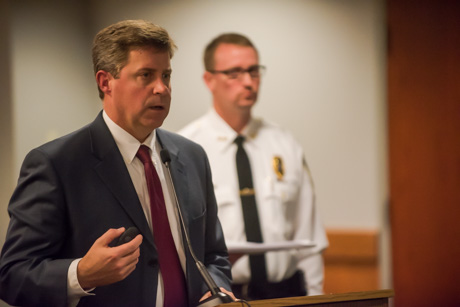
Changes in state law about when and how defense attorneys receive evidence in criminal cases are going to create a greater burden on police and drive up costs for the City and the County, members of the City Council were told Monday night.
City Attorney George Van Nest and Police Chief Shawn Heubusch made about a 40-minute presentation on changes to the rules around what is called "discovery" -- the prosecution turning over evidence and information to the defense -- and bail reform.
"What happened is the legislature passed, and the governor signed, a new form of Section 245 of that criminal procedure law," Van Nest said. "What it did is dramatically change the manner in which criminal discovery is handled in New York State effective January 1, 2020."
Under the current system, once a defendant is charged, a defense attorney would file a motion for discovery and the District Attorney would provide information and evidence the DA felt compelled to disclose under criminal procedure law and case law. This would happen over the course of the criminal proceeding including right up to the day of a trial if there was a trial.
The new law requires "automatic discovery" of everything related to the case within 15 days of the arraignment of the defendant.
This new automatic discovery must include everything related to the case, including all information on witnesses or anybody with information relevant to the case, all written statements, all recordings in police possession or that the police know about, information on all physical evidence, and recordings of relevant 9-1-1 calls and dispatch.
Police officers and detectives will have only days to compile and deliver the evidence and information to the DA's office to give the DA's office time to index and inventory it and prepare it for disclosure to the defendant's attorney.
Both the compressed time frame of gathering and preparing the evidence for dissemination and the greater volume of information and evidence will consume more time for law enforcement and the DA's office.
In the case of traffic tickets -- the city issues about 1,500 a year -- all evidence must be turned over within 24 hours of the issuance of the ticket.
"This increases the workload of our officers and detectives and supervisors and our clerical staff," Heubusch said. "Officers and detective are going to be mandated to complete all paperwork and supporting documentation on a condensed schedule. What that equals is officers may be required to work overtime or maybe taken off of proactive police patrols in our community to make sure that we meet these timeframes so we don't lose any cases."
To help deal with the increased workload, the DA's office is adding another assistant district attorney, another paralegal and a part-time clerk.
Heubusch did not ask for additional personnel in his department but did note that the part-time clerk who handled evidence will now be needed on a full-time basis.
As for bail reform, Heubusch said starting Jan. 1, people accused of misdemeanors or Class E felonies will no longer be arraigned in City Court. The arresting officer, instead, must issue an appearance ticket. The officer must also issue appearance tickets, rather than taking the suspect in for arraignment, for second-degree burglary 2nd and second-degree robbery, all other violent felonies are still eligible for a bail review by a judge.
Types of criminal accusations that will require an appearance ticket include bail jumping, resisting arrest, vehicular assault, menacing, and criminal contempt (unless it's part of a domestic violence case).
Exceptions to the no-bail rules include cases involving members of the same household, a failure to identify oneself properly, a failure to appear in the previous two years, and cases where the defendant could have a driver's license suspended or revoked.
If a judge is going to set bail, the judge must set it as the least restrictive option. In most cases, this means release on own recognizance or release under supervision.
